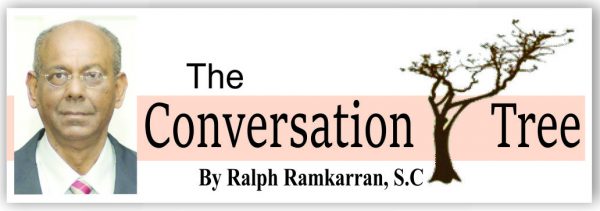 Guyana, and indeed the world, has moved on in significant ways since June 13, 1980, when Walter Rodney was assassinated. From an authoritarian dystopia, where opposition political activists, particularly of the WPA, were invited to make their wills, where political activists were imprisoned, harassed or killed, where the economy was bankrupt, where the press was not free, where the leading western countries saw the regime as a bulwark against communism, and where the communist and progressive world saw it as a leader in the struggle against western imperialism, Guyana emerged as a democratically governed country in 1992, with the help of the same western countries, which today, in 2020, joined by a hitherto silent CARICOM, are now in a defining effort to sustain that democracy.
Guyana, and indeed the world, has moved on in significant ways since June 13, 1980, when Walter Rodney was assassinated. From an authoritarian dystopia, where opposition political activists, particularly of the WPA, were invited to make their wills, where political activists were imprisoned, harassed or killed, where the economy was bankrupt, where the press was not free, where the leading western countries saw the regime as a bulwark against communism, and where the communist and progressive world saw it as a leader in the struggle against western imperialism, Guyana emerged as a democratically governed country in 1992, with the help of the same western countries, which today, in 2020, joined by a hitherto silent CARICOM, are now in a defining effort to sustain that democracy.
Walter Rodney most certainly had a role, and an inspiring one, in the freedom of Guyana, even though he was cut short before he could experience it and help to shape its contours. Although a small and unassuming man, of modest disposition, he brought youth, glamour, courage, dynamism and charisma to Guyana’s politics after the searing experiences of the rigging of the 1973 elections, which saw the seizure of the ballot boxes by the Guyana Defence Force in which David Granger was an active soldier, and the awarding to the PNC of a two-third majority. This facilitated the changing of the Constitution and the installation of Burnham as President in 1980, the year that Walter Rodney was assassinated, with powers about which there are still complaints.
There is no doubt that if Rodney were alive today, he would have had difficulty with our system of majoritarian democracy and would have supported a form of politics or government that would have structurally hindered the drive for ethno-political dominance. The circumstances would not have emerged for him to take the WPA into a partisan alliance with the PNCR.
It was only upon the return of Rodney to Guyana in the mid-1970s that relations with between the PPP and the WPA grew organically and were sustained until shortly after 1992. Rodney would not have been able to prevent the electoral demolition of the WPA at the 1992 elections, which were dominated by the PPP and PNC, by ethnic voting patterns. After then, however, Rodney, with his talented political and academic skills, would not have failed to grasp the negative consequences of the drive for ethno-political dominance, the real reason behind rigged elections. His struggle with the WPA thereafter, would surely have been defined by the effort to implement the basic principles of shared governance that the PPP and the WPA had agreed to in the late 1970s, fifteen years before. Even with an electorally weakened WPA, Rodney would almost certainly have aided Cheddi Jagan in resisting internal PPP reluctance in moving towards a reformed political system, which would have ensured a stable Guyana today. This is the extent to which the assassination of Walter Rodney has deprived Guyana.
Had Rodney been alive, no Guyanese who is familiar with the 1970s, can envisage the situation which has arisen in Guyana today. The incoming Chair of CARICOM, speaking as Prime Minister of St. Vincent and the Grenadines, said on June 10 as regards the Guyana elections, “you have to declare the winner in accordance with the recount.” He added that CARICOM will not stand idly by while the results of the recount, which was properly done, to be set aside. He expects that GECOM will honour the results of the recount and declare a winner. Caricom will not “tolerate anybody stealing an election.” Mr. Joe Harmon, on behalf of APNU+AFC, later said that Gonsalves took a position that is “prejudicial to the integrity of the process and its eventual outcome.” He expressed the coalition’s concern that Gonsalves proposes to direct GECOM, a constitutional body, in the execution of its duties. He called on Chair of Caricom, Prime MInister Mia Motley of Barbados, to distance CARICOM from Gonsalves’s remarks. My Owen Arthur, a long time former Prime Minister of Barbados, and Head of the Commonwealth Observer Mission to the March 2 elections, gave a a lengthy response supporting Gonsalves statement as being in accord with CARICOM’s Charter of Civil Society, which upholds free and fair elections. He said that Mr. Harmon is a “utensil” who does not have the capacity to challenge a Prime Minister and that President Granger should disavow Harmon’s comments.
More concerning, however, and what certainly appears to be behind recent international comments in relation to the recount, and Harmon’s attack on Gonsalves, since supported by Granger, is the fear that the pressure on GECOM of APNU+AFC’s embrace of unproven and clearly untenable allegations of 80+ thousand of dead and migrated voters, will result in a declaration that the elections be nullified. President Granger has now adopted the already discredited narrative of fraud as well as the frightening and illegal possibility of the elections being nullified by GECOM in his recent interview with Mark Benschop. Gonsalves, therefore, knows what he is talking about.
If Walter Rodney were alive today, it is unlikely that Guyana would have continued to be haunted by the historic political fears, uncertainties and insecurities that have troubled this land.





